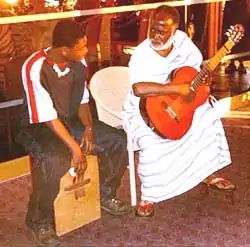Koo Nimo
Koo Nimo (born Kwabena Boa-Amponsem[1] on 3 October 1934),[2] baptized Daniel Amponsah[1] is a leading folk musician of Palm wine music or Highlife music from Ghana.[3][4]

Biography
Born in the village of Foase, in the Atwima District of the Ashanti Region in Ghana, West Africa, he worked in various jobs in science and medical-related fields while maintaining his interest in music. In 1957, when the former British colony of the Gold Coast became the independent country of Ghana, Koo Nimo first received national acclaim through the formation of the Addadam Agofomma ensemble. Many of his songs tell traditional stories and are sung in the Twi language. Along with one or two guitars and vocals, the traditional Ashanti palmwine ensemble consists of traditional instruments of West Africa, including the apentemma and the donno, the frikyiwa (metal castanet), the prempensua (rhumba box), the ntorwa (hollow gourd rattle with beads or seeds woven around it on a net), and the nnawuta (consisting of two iron bells that provide the key rhythmic pattern) or dawuro (banana-shaped bell).
In 1990, eight of Koo's songs were released as a compact disk entitled Osabarima. This was the first work by a Ghanaian artist to be put on CD.[5] In January 1992, at Columbia University, New York, USA, Andrew L. Kaye presented his dissertation entitled "Koo Nimo and his circle: A Ghanaian Musician in Ethnomusicological Perspective" and was awarded a Doctor of Philosophy degree for his work.
In 1998, he was employed as a Professor of Ethnomusicology at the University of Washington in Seattle, USA, for two years, before taking a similar position at the University of Michigan in Ann Arbor.
In 2006, Koo Nimo moved back to Ghana, to the city of Kumasi. He appeared in a January 2007 episode of the American travel show Anthony Bourdain: No Reservations, where he is shown playing music, discussing his music, and enjoying a lunch of stewed greater cane rat with host Anthony Bourdain.[6]
Awards, honours and memberships
In 1979, in recognition of his services to Ghanaian music as performer, teacher and administrator, Koo Nimo was elected President of MUSIGA (the Musicians' Union of Ghana). His countrymen appreciated not only his music, but his love and respect for tradition. In 1985 Koo Nimo was appointed interim chairman of COSGA, the Copyright Society of Ghana. More recently he has been made an honorary life member of the International Association for the Study of Popular Music, along with such distinguished names as Professor J. H. K. Nketia and John Collins.
In February 1991, in recognition of his services to music and to his country, Koo received the prestigious Asanteman award from the Asantehene. In March, he received the Flagstar Award from ECRAG (Entertainment Critics and Reviewers Association of Ghana). In 1991, he was invited to serve on the National Folklore Board of Trustees.
In March 1997, the Ghana government celebrated the 40th anniversary of independence by awarding gold medals to forty of its distinguished citizens, one of whom was Koo Nimo. This was in recognition of his efforts to preserve traditional culture. In the next month he received the Konkoma Award for his contribution to Ghanaian Highlife Music.
Discography
- Albums
- Ashanti Ballads (1968)
- Osabarima (1990, re-issued 2000)
- Tete Wobi Ka (2000)
- Highlife Roots Revival (2012, Riverboat Records)
- Contributing artist
References
- Koo Nimo. "Daniel 'Koo Nimo' Amponsah". Seattle Art Museum. Archived from the original on 15 March 2012. Retrieved 12 March 2012.
- Andrew L. Kaye (1999). "Koo Nimo: A Contemporary Ghanaian Musician". Journal of the International Library of African Music. International Library of African Music. 7 (4): 147–165.
- "Koo Nimo - King of Palmwine Music". GhanaWeb. 16 September 2008. Retrieved 31 August 2010.
- "King of Palmwine Music". AllAfrica.com. 14 September 2008. Retrieved 31 August 2010.
- High Fidelity Magazine, September 1990, 103.
- Joseph Teye-Kofi, Anthony Bourdain: No Reservations: Ghana, Vimeo, 8 January 2007.
External links
- Christopher Lydon; Koo Nimo (11 February 2010). "Ghana Speaks (IV): … and Koo Nimo plays guitar and sings". Radio Open Source.
- Koo Nimo on YouTube - from Sublime World Productions Sounds from Ghana documentary